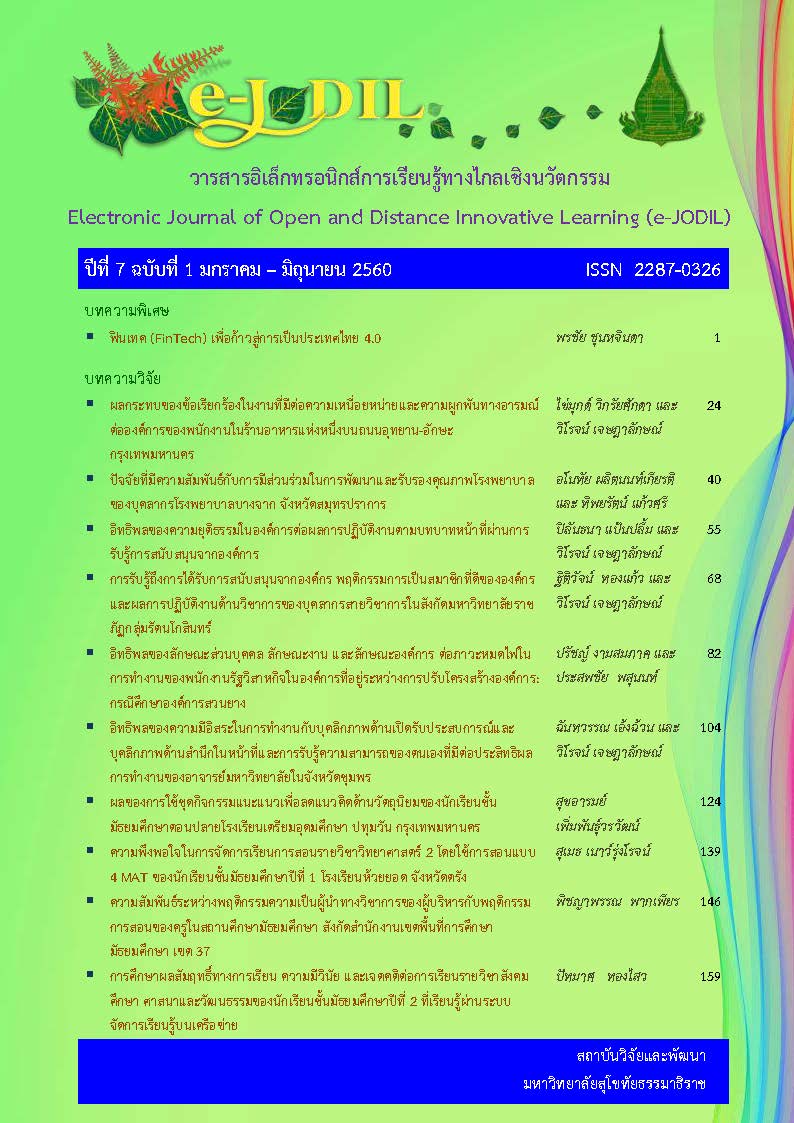ผลกระทบของข้อเรียกร้องในงานที่มีต่อความเหนื่อยหน่ายและความผูกพันทางอารมณ์ต่อองค์การของพนักงานในร้านอาหารแห่งหนึ่งบนถนนอุทยาน-อักษะ กรุงเทพมหานคร
Main Article Content
บทคัดย่อ
การวิจัยครั้งนี้มีวัตถุประสงค์ 1) เพื่อศึกษาผลกระทบของข้อเรียกร้องในงานต่อความเหนื่อยหน่ายในการทำงานของพนักงานร้านอาหาร 2) เพื่อศึกษาผลกระทบเกี่ยวกับความเหนื่อยหน่ายในการทำงานกับความผูกพันทางอารมณ์ต่อองค์การของพนักงานร้านอาหาร 3) เพื่อศึกษาผลกระทบของความเหนื่อยหน่ายในงานต่อข้อเรียกร้องในงานกับผูกพันทางอารมณ์ต่อองค์การของพนักงานร้านอาหาร การวิจัยครั้งนี้ใช้ระเบียบวิจัยเชิงปริมาณ โดยใช้แบบสอบถาม กลุ่มตัวอย่าง คือพนักงานร้านอาหารระดับกลางแห่งหนึ่งบนถนนอุทยาน-อักษะ กรุงเทพมหานคร จำนวน 100 คน แล้วนำข้อมูลมาวิเคราะห์หาความสัมพันธ์ระหว่างตัวแปรอิสระโดยใช้ค่าสหสัมพันธ์เพียร์สันและวิเคราะห์อิทธิพลของตัวแปรโดยใช้เทคนิคการถดถอยแบบพหุคูณ จากผลการวิจัยพบว่า ข้อเรียกร้องในงานมีอิทธิพลเชิงบวกต่อความเหนื่อยหน่ายในงาน อีกทั้งข้อเรียกร้องในงานมีอิทธิพลเชิงลบต่อความผูกพันทางอารมณ์ต่อองค์การ สำหรับการทดสอบตัวแปรกลางพบว่า ความเหนื่อยหน่ายในงานเป็นตัวแปรกลางที่มีอิทธิพลระหว่างข้อเรียกร้องในงานต่อความผูกพันทางอารมณ์ต่อองค์การ ผู้วิจัยได้สรุปผลการวิจัยพร้อมทั้งเสนอแนะการนำผลการวิจัยไปประยุกต์ใช้ และการทำวิจัยประเด็นนี้ในอนาคต
Downloads
Article Details
บทความ ข้อความ ภาพประกอบ ตารางประกอบ ที่ตีพิมพ์ในวารสารเป็นความคิดเห็นและความรับผิดชอบของผู้เขียนแต่เพียงผู้เดียว ไม่เกี่ยวข้องกับมหาวิทยาลัยสุโขทัยธรรมาธิราชแต่อย่างใด
บทความที่เสนอพิจารณาในวารสาร e-JODIL ต้องเป็นบทความที่ไม่เคยส่งไปลงพิมพ์ เผยแพร่ หรืออยู่ระหว่างการพิจารณาของวารสารอื่น
กองบรรณาธิการขอสงวนสิทธิ์ในการพิจารณาและตัดสินการตีพิมพ์บทความในวารสาร
เอกสารอ้างอิง
สายบัว บุญหมื่น, นภาพร ขันธนภา, มนตรี พิริยะกุล และ ประยงค์ มีใจชื่อ. (2557). ความสัมพันธ์เชิงโครงสร้างของปัจจัยที่มีอิทธิพลต่อความตั้งใจลาออกจากงานของพยาบาลวิชาชีพในโรงพยาบาลภาครัฐ. วารสารการจัดการ 7(1), 125-138
Babakus, E., Yavas, U., Ashill, J. N. (2009.) The role of customer orientation as a moderator of job demand-burnout-performance relationship: A surface-level trait perspective. Journal of Retailing, 85, 480-492.
Baron, R.M. and Kenny, D.A. (1986). The modulator-mediator variable destination in social psychology research: conceptual, statistical consideration. Journal of Psychology and Social Psychology, 51, 1173-1182.
Beauchamp, M. R., Bray, S. R., Eys, M.A., and Carron, A.V. (2005). Leadership behavior and Multi dimensional role ambiguity perceptions in team sports. Small Group Research, 36, 5-20.
Chen, C.F. and Kao, Y.L. (2011) Investigating the antecedents and consequences of burnout and isolation among flight attendants. Tourism Management, 33, 868-874.
Curtis, R. C., Upchurch, S. R., Severt, E.D. (2009). Employee motivation and organizational commitment: A comparison of tipped and nontipped restaurant employees.International Journal of Hospitality & Tourism Administration, 10, 253-269.
Dermody, M., Young, M, Taylor, S. (2008). Identifying job motivation factors of restaurant servers: insight for the
development of effective recruitment and retention strategies.International Journal of Hospitality and
Tourism Administration, 5(3), 1-14. (published online version)
Frudenberger, H.J. & Richelson, G. (1985). Burnout: The high cost of high achievement. Garden City, NY: Doubleday.
Gropade, J., Lackritz, J. and Singh, G. (2011). Personality as a mediator of the relationship between role conflict,
role ambiguity, and burnout. Journal of Applied Social Psychology, 41(6), 1275-1298.
Hayati, K. and Caniago, I. (2012) Islamic Work Ethic: The Role of Intrinsic Motivation, Job Satisfaction,
Organizational Commitment and Job Performance. Procedia-Social and Behavioral Sciences, 65, 272-277.
Johanson, M.M., Woods, R.H. (2008). Recognizing the emotional element in service excellence. Cornell Hospitality Quarterly, 49, 310-316.
Kandampully, J. (2006). The new customer centered business model for the hospitality industry. International Journal of Contemporary Hospitality Management, 18 (3), 173 – 187.
Khaya, E. (2007). The effects of job characteristics and working conditions on job performance. International Journal of Industrial Ergonomics, 37, 515-523.
Kim, J.H. (2008). Hotel service provider’s emotional labor: The antecedents and effect of burnout. International Journal of Hospitality Management, 27, 151-161.
Knight, W. E., & Leimer, C. L. (2010). Will IR Staff Stick? An exploration of institutional researcher’s intention to remain or leave their job. Res High Educ, 51, 109-131.
Krejcie, R.V. & Morgan, D.W. (1970). Determining Sample Size for Research and Activities. Educational and Psychological Measurement.
Lin, Y. W. (2013). The causes, consequences, and mediating effects of job burnout among hospital employee in Taiwan. Journal of Hospital Administration, 2(1), 16-27.
Lovelock, C., and Wirtz, J. (2010). Service Marketing: People, Technology and Strategy. (5th ed.).Prentice Hall.
Madare, J.M., Dawson, M. and Nael, J.A.(2013). Hotel manager’s perceived diversity climate and job satisfaction: The mediating effects of role ambiguity and conflict. International Journal of Hospitality Management, 35.28-34.
Mayer, J.P., & Allen, N.J. (1997). Commitment in the workplace: Theory, research and application. Thousand Oaks, CA: Sage.
Muhammad, H. A. Hamdy, H.I. (2005). Burnout, supervisory support, and work outcomes: A study from an Arabic cultural perspective. International Journal of Commerce & Management, 15(3-4), 230.
Mohr, A.T. and Puck, J.F. (2007). Role conflict, general manager job satisfaction and stress and the performance of IJVs. European Management Journal, 25(1) 25-37.
Podsakoff, N.P., LePine, J.A., LePine M. A. (2007). Different challenges stressors-Hindrance stressors Relationships with job attitudes Turnover Intentions, and withdrawal behavior Common Method Business in Behavior Research: A Meta-analysis. Journal of Applied Psychology, 88(5), 879-903.
Rod, M., Ashill, J. H., Carruthers, J. (2008). The Relationship between job demand stressors, service recovery performance and job outcomes in state-owned enterprise. Journal of Retailing and Customer Services, 15(2008), 22-31.
Yesiltas, M. (2014). The effects of role ambiguity and role conflicts experience by employees of the hotel on their customer oriented pro-social service behavior. The Macro Review, 3(7), 34-45.
Yunus, J.B., Mahajar, A. J. (2015) Work overload, role ambiguity, and role boundary and its effect on burnout among nurse of public hospitals in Malaysia. International Journal of Research in Humanities and Social Studies, 2(10), 18-25.


